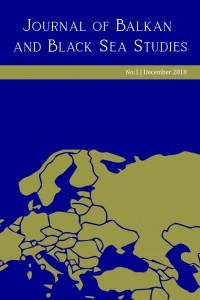Introduction to the Special Issue: Powershifts, Practices and Memories of Violence in the Balkans
Introduction to the Special Issue: Powershifts, Practices and Memories of Violence in the Balkans
___
- Bergholz, Max. Violence as a Generative Force: Identity, Nationalism, and Memory in a Balkan Community. Ithaca, NY: Cornell University Press, 2016.
- Höpken, Wolfgang. "Performing Violence: Soldiers, Paramilitaries and Civilians in the Twentieth-Century Balkan Wars." In No Man's Land of Violence: Extreme Wars in the 20th Century, edited by Alf Lüdtke and Bernd Weisbrod, 211-49. Göttingen: Max-Planck-Institut für Geschichte / Wallstein Verlag, 2006.
- Kienzler, Hanna, and Endkelejda Sula-Raxhimi. "Collective Memories and Legacies of Political Violence in the Balkans." Nationalities Papers: The Journal of Nationalism and Ethnicity 47, Special Issue: Collective Memories and Legacies of Political Violence in the Balkans, no. 2 (2019): 173-81.
- ISSN: 2667-470X
- Yayın Aralığı: Yılda 2 Sayı
- Başlangıç: 2018
- Yayıncı: Mehmet HACISALİHOĞLU
Kosovo: From the Ottoman Empire through Yugoslavia to independence
Introduction to the Special Issue: Powershifts, Practices and Memories of Violence in the Balkans
The Yugoslav State Security Service and Physical Violence in Socialist Kosovo
Political Violence in a Borderland. The Region of Kastoria under Italian Occupation (1941-1943)
Bulgaria’s Secret Empire: An Ultimatum to North Macedonia
